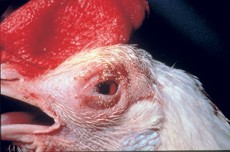What to look for
Newcastle disease only affects birds, particularly poultry, such as chickens. It can cause illness and death in large numbers of birds quickly. Infected birds may show signs of:
- loss of appetite, coughing, gasping, nasal discharge, watery eyes, bright green diarrhoea and nervous signs such as paralysis and convulsions
- combs and wattles may look swollen, enlarged and discoloured (purple or blue)
- reduced egg production and the few eggs that are produced may be soft shelled and malformed.
What you can do
- Do not move live animals or poultry products, including eggs, feathers with skin still attached, meat, skins or carcasses out of the Torres Strait Protected Zone to the Torres Strait Permanent Biosecurity Monitoring Zone, or from either zone to mainland Australia without a permit and an inspection by a Department of Agriculture, Fisheries and Forestry biosecurity officer.
- Report any signs of illness or death in birds to the Emergency Animal Disease Hotline on 1800 675 888.
- Do not let domestic and wild birds come into direct contact and don’t use the same equipment for treating wild and domestic birds.
![]()

Live animals and poultry products, including eggs and feathers with skin still attached need a permit to move south between zones and to mainland Australia.
Profile
Newcastle disease is one of the most serious of all infectious bird diseases. It is a devastating virus that can spread rapidly and could kill thousands of native and introduced bird species, and could severely damage Australia’s egg, chicken, bird meat and aviary industries. Once it infects a flock, many birds can be affected. The number of deaths can be high and those birds that do recover can transmit the disease to healthy birds.
Identification
Symptoms of Newcastle disease include loss of appetite, coughing, gasping, nasal discharge, watery eyes, bright green diarrhoea and nervous signs such as paralysis and convulsions. Combs and wattles may be swollen and discoloured (purple or blue). Egg production drops dramatically and the few eggs that are produced may be soft shelled and malformed. Any of these symptoms or an unusual number of unexplained deaths in a flock should be reported immediately by calling the Emergency Animal Disease Hotline on 1800 675 888.

Newcastle disease is an extremely serious infectious bird disease. Symptoms include coughing and gasping.
Distribution
This disease is a major problem in Indonesia and Timor-Leste. Outbreaks have been reported in Papua New Guinea as recently as May 2013. Australia is free from severe strains. Outbreaks have occurred occasionally in commercial flocks in Australia.
Threat
The disease can strike commercial flocks, fancy breeds, caged and wild birds. To control an outbreak all birds in an infected flock are immediately destroyed and quarantine controls put in place to try to limit the spread of the disease. This is followed by months of cleaning, disinfection and spelling of sheds before a new flock can be established, with accompanying loss of income and livelihood over a long period.
Keep a Top Watch!
Imports of live birds, eggs and bird products are not permitted except under strict conditions. Keep a watch on wild and domestic birds and if you see sick birds or more deaths than usual, call the Emergency Animal Disease Hotline on 1800 675 888.
For any suspicious movements or illegal imports of birds, bird products, feathers or eggs from overseas contact NAQS.
For further information or advice please contact NAQS.
